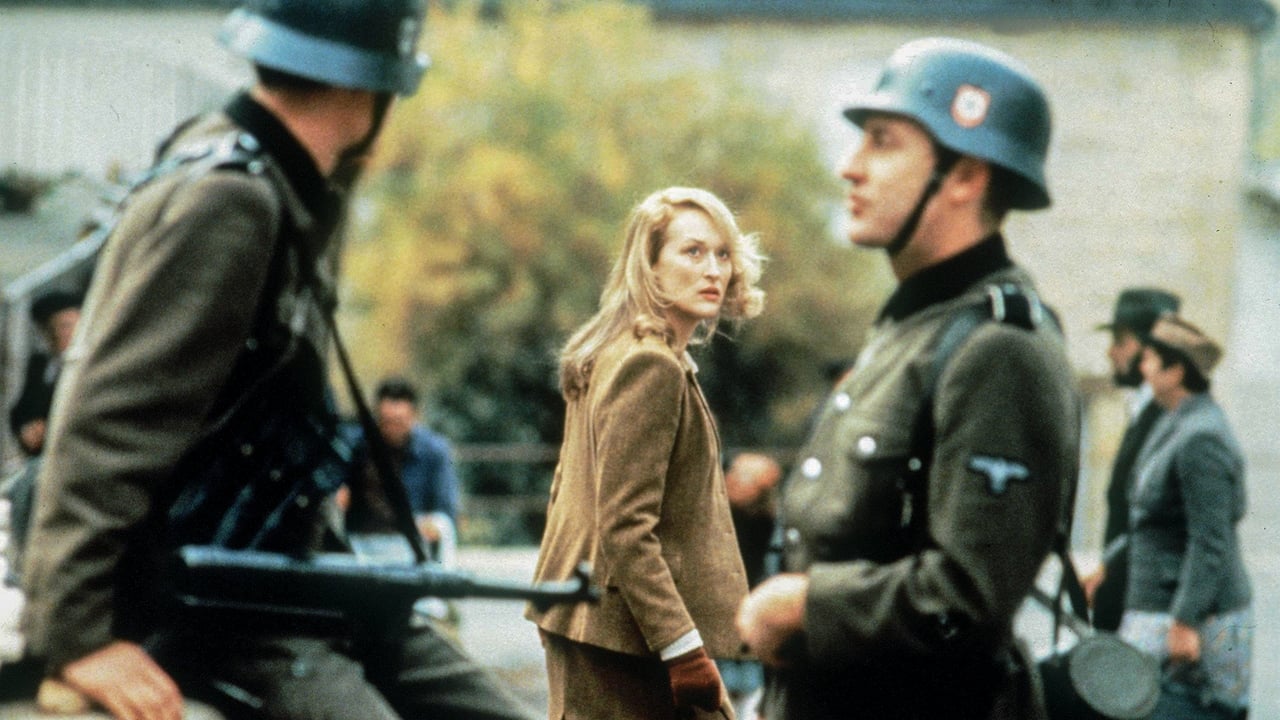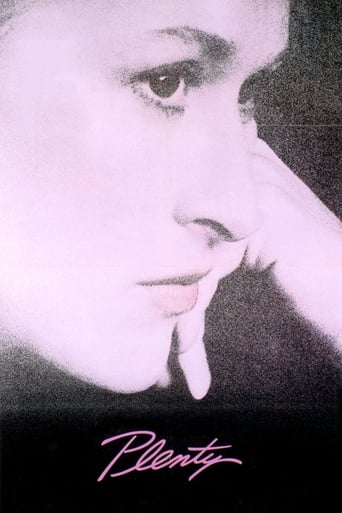Titreenp
SERIOUSLY. This is what the crap Hollywood still puts out?
ChicRawIdol
A brilliant film that helped define a genre
WillSushyMedia
This movie was so-so. It had it's moments, but wasn't the greatest.
mraculeated
The biggest problem with this movie is it’s a little better than you think it might be, which somehow makes it worse. As in, it takes itself a bit too seriously, which makes most of the movie feel kind of dull.
Diego Sada Jr
Plenty is one of my all-time favourite films. I loved this movie.I understand why many people did not like it, but I think they should have another look. Sure, it is not an easy movie to watch, and Meryl Streep's character is not the most pleasant woman in the world, but that is part of the point. "Plenty" is unabashedly unsentimental, and that is one of its greatest strengths.Meryl Streep gives one of her best performances, and it's not only because of her flawless British accent. That is just the surface of Ms. Streep's complete, and absolutely brilliant transformation into a very complicated character. She is also sexier than she has ever been on screen up to that time. She looks simply beautiful!!This film is about as performance-oriented as films get, and it is full of great performances -the entire cast is excellent!!"Plenty" is a movie about how different life can turn out from the way we plan it. It is not supposed to be cheerful. It is gritty, gripping, and extremely powerful. It portrays the hardships of Resistance era France, and the harsh realities of Britain immediately after the Second World War; as well as the decadence that prosperity can bring, and the disappointments of life, and how the inability to deal with them can destroy a person's sanity.Of particular note are Charles Dance, as Streep's husband, Sam Neil as her lover, Sting and Tracey Ullman in small but important supporting roles, and especially Sir John Gielgud, who effortlessly steals the few scenes he is in. In one of the movie's few comic moments, Mr. Gielgud corrects the wife of a Burmese diplomat just as he is leaving a dinner party on the nationality of a certain European film director. Just this scene makes the movie worth watching!I have seen this movie described as an underrated tour-de-force. That is an extremely fitting description. I would add the word classic to that description. This is a film that challenges the viewer to sit through its grim depictions of what life can be like if we don't know how to deal with life not turning out like we want it to. Depicting different eras from the Second World War to the early to mid sixties, "Plenty" is a period piece with painstaking recreations and some incredible locations in England, France and Jordan.If someone has not seen this movie, I urge them to buy it or rent it and watch it. For a long time, this film was not available in widescreen on home video. Now there is at least one widescreen DVD which restores the film to its stunning beauty and allows us to enjoy its excellent cinematography. To anyone who appreciates great acting, this film is a MUST SEE. No serious film collector should be without this great classic.If someone has seen it but did not like it, I urge them to watch it again, and again.I have seen this film at least 50 times, and I could easily watch it 50 times more.
T Y
I have known this movie now for 30 years. Almost no one I know saw it back in 1985. The one person who did see it didn't understand it, though he tried. His feelings were neutral, but his bewildered description intrigued me. He didn't get what I've got out of it all these years. I find it meaningful in different ways in each phase of my life, Now I see a strong message of the futility of trying to recapture the past, the intensity of the past, or one's youth. There is also a tacit reading of the film that the world grows less interesting over one's life, until one is left in a bland holding pattern. Each frame of the movie stands as a testimony to how much better things used to be, when you were young and feeling things intensely.The most generous thing you might feel about these character is confusion or ambivalence. You do not grow fond of them as the movie proceeds. Some of them are contemptible and/or dysfunctional. There is more to movies than liking the characters. This is a movie for thinking viewers, which were rare in 1985, and now all but gone.The movie is never jejune or coddling as later Streep movies are (Julia and Julia, The Devil wears Prada - weak filmmaking) and that's a testimony to capability of director Fred Schepisi, who seems to only film thoughtful scripts. Schepisi is a criminally underrated director. Schepisi also did good work on A Cry in the Dark, and really excellent work on The Devils Playground. As with all his movies this one is beautifully lensed, and the aspect ratio is very elegant.If anything is wrong with the movie it's that there's too much of the Charles Dance character (the bland, decent, diplomat husband) in it, especially in the last 45 minutes. He's not interesting, doesn't make a very good foil, and in some scenes seems to only exist as a device glue said scenes together.This is hard to track down, but is far better movie than Sophie's Choice, Silkwood, Out of Africa, where Streep played characters with more easily described dilemmas.
treeline1
Meryl Streep stars as a young British woman working for the French resistance during WWII. After the war, she goes home and we see the next 20 years of her life.I didn't get this movie at all. I thought it was poorly conceived and written and basically a bore. Streep was the only good actor in the cast and she overacted a lot in a very unsympathetic role. Though the movie spans twenty years, she didn't age at all, looking luminously young and beautiful throughout. The director chose not to have fade-outs or subtitles telling us what year we were watching, so we had to guess by looking at the clothing styles. Very confusing and tiresome.We do get to see a dark-haired Ian McKellen as a stuffy diplomat and a young Sting as a clueless stud. But nothing much happens in this film; it's just endless talking (it's based on a play) and nothing interesting or touching is said. Odd and off-putting, this is one to skip.
Pangborne
The problem with PLENTY is that the first half is too slow andspends too much time setting up the second half. The long scenein the British Embassy, the "riotous" living with the loose setin Pimlico - these scenes drag on and add little to our understandingof Susan, or, at the very least, are told as though they weremerely necessary and not intrinsically interesting. However, onceshe really starts going off the deep end, about the time she hooksup with Sting, it catches fire, and burns brighter and brighter.The quality of the second half is so strong that it easily nullifiesthe ill-effects of the first half.

